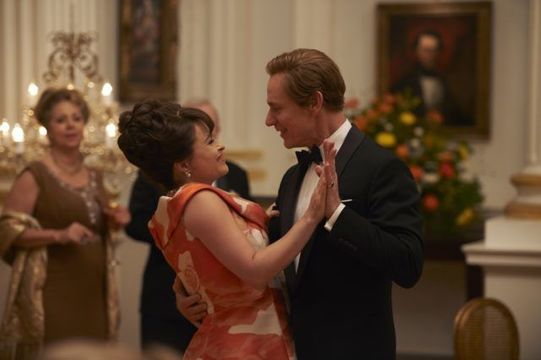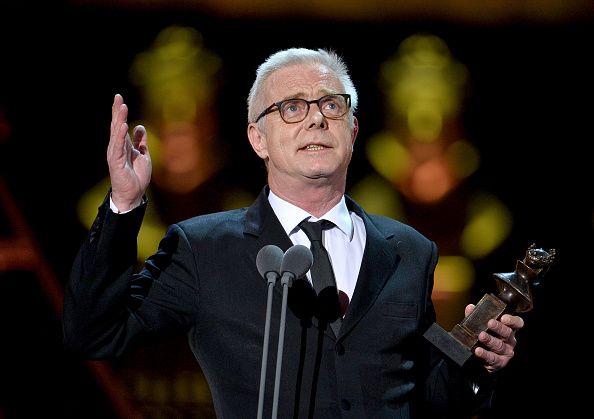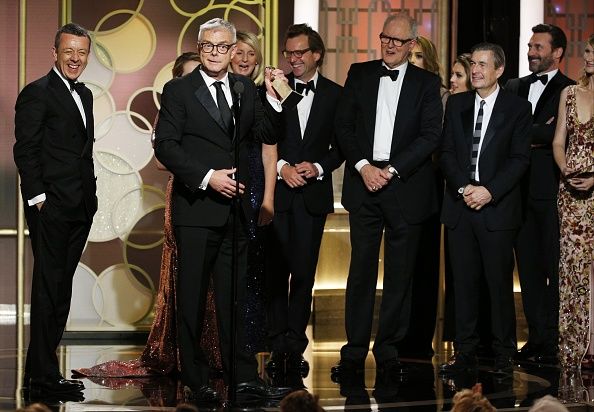
Want to know what happens in The Crown season three and how Queen Elizabeth feels about the show? We spoke to creator Stephen Daldry about everything Crown-related
“I feel that she’s sort of my grandmother,” executive producer and director Stephen Daldry (The Hours, Billy Elliot) says of Queen Elizabeth. If that’s true, it could make him the most attentive grandson ever, having focused on Her Majesty in two major projects. Here's our Stephen Daldry interview.
First, The Audience, the 2013 play with Helen Mirren, and now The Crown, the much-loved Netflix series which returns this year for a third season, starring Olivia Colman, Tobias Menzies and Helena Bonham-Carter in a lavish, epic-scale production.
Read more: The Downton Abbey movie plot has been revealed and includes a royal visit
Working on The Crown
Opening on a pretty young girl smitten with a slick naval officer, the show follows the young queen through political battles and family dramas - always intricately, and terribly, intertwined. As historical events shape her nation, responsibilities shape Elizabeth, a woman who, if not for her uncle’s abdication of the throne, could have become “an ordinary English countrywoman,” and might even have been happier that way. Though Britain, without her, certainly would not.
Director Stephen Daldry spoke to BHT about capturing the first decade of Elizabeth’s rule for the small screen, including the expensive trappings of royalty, the struggle between Buckingham Palace and Downing Street and the enormous pressures of being the “most visible invisible woman in the world.”

Daldry accepting an Olivier Award
You’re something of a Queen Elizabeth expert at this point after the play and now this series?
One of the great advantages in working with [writer and creator] Peter Morgan and Left Bank Pictures is the degree and the complexity of the research by the team. I’ve been delighted over the last few years to work with such a brilliant team.
What’s interesting about The Crown—and The Audience, actually—is everything is meticulously researched. Almost every situation we know happened. Obviously, a lot of the dialogue is different; we make that up. What’s remarkable is certain things that you’re not expecting to be absolutely true were researched - and are, in fact, true.
It has been a great joy to get into that much detail about this incredibly complex family and the pressures and dilemmas they face, and have faced since 1947. It’s been an extraordinary journey getting to know them, really.
Of course you feel, being a British person, you’ve grown up with them. I feel that she’s sort of my grandmother. In one sense, I think I know her very well, because she’s always been there, all my life. And as Peter Morgan says, one of the most extraordinary things is that she’s the most visible invisible woman in the world. You think you know her, and then you don’t. I think that’s one of the great skills that she’s had as a sovereign.
Read more: Did you know Harry and Meghan have joined Instagram?
Somehow, she’s understood the dilemma of the difference, really, between the two characters, the two people. One is Elizabeth Windsor and the other is Elizabeth Regina. She has understood those two roles and tried to keep Elizabeth Windsor private.
One of the great joys for me is learning so much more about Prince Philip. For whatever reason, in my lifetime, he’s often been a controversial figure…well, not quite knowing who he is. But he was a great modernizer of the royal family, a great wit, a radical in many ways. It wasn’t a popular marriage within the family. We know him for his so-called gaffes, but in fact he’s a fascinating character.
As you say, she’s lived her life in public as privately as possible. Would you agree with Morgan that Buckingham Palace is nervous about the project?
There’s been a certain amount of contact with the palace. Not at the family level, but at other levels. I think they’re aware of what we’re doing. We never expected to get their approval. We couldn’t have asked for their approval, as then we wouldn’t have our own point of view. And it is a drama. It’s based on those characters, and then, as I say, we’ve had to invent, to a certain extent, certain things - particularly all the dialogue.
If I’m being honest about it, do I think the palace, when it comes out, will be terrified about it? I think they were nervous when the film The Queen [also written by Morgan] was made. But, in the end, in fact, The Queen was extraordinarily successful in explaining what was an incredibly difficult moment in the family’s history with the country.
I think the family were relieved because, in fact, it was helpful to explain the pressures that were put upon the Queen and [her] not coming down to London when Princess Di had died and their complications for her, both with the boys and her own feelings about Diana.
In the end, [The Crown] was never intended to be a hatchet job on the family; it was never intended to be a critique on the family. It was more an exploration of the extraordinary drama that is in there, and is very well in the public domain anyway through very many different accounts. Putting all those different accounts into one drama hasn’t been done before. And that’s what’s incredibly exciting about this project.
Read more: Exclusive behind the scenes look at the Downton Abbey movie
What’s the hardest part about re-creating the past?
In this particular instance, the problem with the royal family is that they tend to have expensive clothes, expensive cars and lots of people are there when they go anywhere. They live in palaces. So, it is, by its very nature, an expensive project. You can’t really do this on the cheap.
I suppose you could have done and then it would just be a chamber piece, but we didn’t want that. It is very much meant to be not just the story of that family and the Queen, but also, in a sense, the story of postwar Britain seen through this family. We didn’t want to scrimp and save. It should feel broader than that.
There was meticulous attention by Michele Clapton to costume. Meticulous! As well as to the sets and the props; that took a lot of time and a lot of effort. The last thing to say is that it’s very hard to replicate Buckingham Palace. There is nowhere else really quite like it. Of course, the private apartments are easier to get a sense of, but the state element of Buckingham Palace is unique and there’s not the size of those rooms anywhere around the country. You have to really hunt for [the locations] to get the sense of scale that these people live in.
All of the family relationships were so pressurized by history and responsibility. The Queen walks ahead of her husband and sister. How did those relationships suffer?
She’s head of a family that has historically suffered a trauma [the abdication of Edward VIII] that would threaten the very bedrock of the family and, indeed, of the constitutional monarchy in this country. It was unexpected and the whole family were not prepared. It was never their destiny to be King, Queen and a Princess who was expected to become Queen. That disaster, as they saw it, really hovers over the whole series.
The challenge for the young Queen is to not repeat that disaster, particularly through divorce and the family tearing itself apart. I’m talking now specifically about her sister falling in love with a divorcée [Group Captain Peter Townsend]. A commoner, and let’s be frank about it, a member of staff. And then Elizabeth forbidding that marriage is a fault line that goes right through Princess Margaret’s life. Her sister, the one woman she thought she’d be closest to and would stick by her, in the end has to say no.
It’s the choice of putting the monarchy, for all its glory, and the state—whatever you think about the rules of divorce, looking back at it in time—of putting those priorities above the priorities of family has to provide a huge pressure, particularly on a young woman. Let alone the pressure of having married an alpha male who was expecting a naval career and not expecting to be the Queen’s consort for years. [It happened] 20 years earlier than he was expecting: He’s out of a job and walking behind the Queen three paces. These are big problems for a young Queen to come to terms with and try to navigate.
Just imagine the idea! And it’s almost impossible to imagine it now. She became Queen when Churchill was Prime Minister. The idea that this is the grandfather of England, the father of the nation, and this little Princess turning up in the declining years of his premiership, when he’s suffering strokes and lying to the country about the state of his health—and her having to stand up to him.
Read more: Will the Downton Abbey movie feature Matthew Crawley
That’s my favorite relationship, between her and Churchill. The pressures make them understand each other, whereas it distances her from her loved ones.
Yeah, exactly. He’s very touched by her. And I think that John [Lithgow] plays that beautifully.
Stephen Daldry accepting an award 
There’s a constant meditation on the responsibilities of her position - on being impartial, doing less, creating authority and stability by pulling back. Does that suit Elizabeth’s nature, in a way?
To a certain extent. Whether it’s true or not, we don’t really know. We imagine that there’s a huge tension about her wanting to act, wanting to be, wanting to intervene, knowing when things are morally wrong or inappropriate—and still having to toe the line, not being able to speak. The idea of being constitutionally silenced in her moral objections to moments feels very strong to me. I can only imagine how difficult that must be.
There are these grand historical moments that shaped the politics and personal lives. Which do you think was most momentous for Elizabeth?
That’s a very good question isn’t it? She’s moving into a postcolonial world and the idea of trying to maintain that thing called the Commonwealth. Knowing that that empire is gone and believing that the Commonwealth is something real and viable and not a nostalgic attachment to empire, but is something that can actually be of use to the country—and the country being of use to the Commonwealth.
It’s something she’s believed in and struggled for her whole life and believes in very passionately. I admire her for it, in a way. You could argue, as some people do, that her interest and passion for the Commonwealth is one of the reasons why Britain’s never embraced the EU. The Commonwealth and the EU are in direct opposition to each other. Whether that’s true or not, we’ll find out in subsequent seasons.
Read more: The Irish Lord who captured Queen Elizabeth's heart
Were they nervous, the cast? The way that Claire Foy clasps her hands in front of her is so entirely Elizabeth-like to me.
We did spend a lot of time on that and the particular gait of her walk and—as you’ll see as the season progresses—how she ages and how her weight changes as she goes from a young Queen to a middle-aged Queen. In that sense, it’s not meant in any way to be an impersonation, but we did spend a significant amount of time trying to find an echo or an essence of the real character as we understand it.
Perhaps I’m extrapolating too much from other British dramas, but it feels like there’s an Upstairs Downstairs element, only the Downstairs is just one tiny step below—with Churchill and Eden and powerful people—and those people often have even more control.
That was one of the great joys of the conceit. In a sense, it’s a battle of two houses. You’ve got the house, Buckingham Palace, the House of Windsor—and then you’ve got Downing Street, but Downing Street actually has more power over Buckingham Palace. It’s not quite Upstairs Downstairs, because the government—whether it’s Cabinet or whether it’s the civil servants—are all very much in charge of how the family should or shouldn’t react to situations. Seeing how they react, sometimes against and sometimes with government, is one of the great tensions of the season.
Yet Elizabeth eventually realizes that she can also control how her family is handled.
SD: And as a young Queen, how much power she has over the old men who seem to be running the country, or attempting to run the country.
It’s thrilling to watch this young woman, apparently controlled by Downing Street, coming to understand what power she does have. The simple idea of a constitutional monarch, where they are there to advise and warn the Prime Minister…her understanding what that voice is within the constitutional monarchy, what her power and her influence can be, I think that’s one of the great discoveries for her as a Queen—and one of the great discoveries for us as an audience.
Read more: Does the Queen have secret hand signals?
The third season of Netflix’s The Crown will be released in 2019. Visit netflix.com to find out more.





Comments